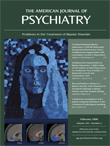Neurocognitive Function in Unmedicated Manic and Medicated Euthymic Pediatric Bipolar Patients
Abstract
OBJECTIVE: A systematic evaluation of neuropsychological functioning in individuals with pediatric bipolar disorder is necessary to clarify the types of cognitive deficits that are associated with acutely ill and euthymic phases of the disorder and the effects of medication on these deficits. METHOD: Unmedicated (N=28) and medicated (N=28) pediatric bipolar patients and healthy individuals (N=28) (mean age=11.74 years, SD=2.99) completed cognitive testing. Groups were matched on age, sex, race, parental socioeconomic status, general intelligence, and single-word reading ability. A computerized neurocognitive battery and standardized neuropsychological tests were administered to assess attention, executive function, working memory, verbal memory, visual memory, visuospatial perception, and motor skills. RESULTS: Subjects with pediatric bipolar disorder, regardless of medication and illness status, showed impairments in the domains of attention, executive functioning, working memory, and verbal learning compared to healthy individuals. Also, bipolar subjects with comorbid attention deficit hyperactivity disorder (ADHD) performed worse on tasks assessing attention and executive function than patients with bipolar disorder alone. CONCLUSIONS: The absence of differences in the deficits of neurocognitive profiles between acutely ill unmedicated patients and euthymic medicated patients suggests that these impairments are trait-like characteristics of pediatric bipolar disorder. The cognitive deficits found in individuals with pediatric bipolar disorder suggest significant involvement of frontal lobe systems supporting working memory and mesial temporal lobe systems supporting verbal memory, regardless of ADHD comorbidity.



